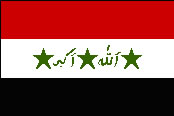July
13 – Baghdad, Iraq: The long awaited Iraqi Council met for the first
time in the capital city to begin work reconstructing the decimated Iraqi
government. According to L. Paul Bremer, Iraq’s American
Administrator, the Council’s powers include the ability to appoint
interim ministers, select an independent central bank governor, and assist
the coalition with the formation of policy as well as the overseeing of
budget. Regardless, the Council is still under the jurisdiction of Bremer
and the Coalition military. The slowness with which the new Council has
formed has been one of the chief contributors to unrest in recent months
having given Iraqi citizens the belief that the coalition forces intended
on occupying Iraq rather than liberating it. One of the first actions of
the Council was to cancel all old holidays commemorating events that took
place during Saddam Hussein’s reign and institute April 9th (the day
Saddam’s power ended with the fall of Baghdad to the US) as a new
national holiday. The Council is a forerunner to a future constitutional
assembly that will write a new Iraqi constitution with one year.
The council has twenty-five members including 13 Shiites, five Sunnis, five
Kurds, one Assyrian Christian, and one Turkmen. There are three women (one
the only Turkmen, and two of the Shiites) on the council and several prominent
tribal leaders. There are seven main political parties in the new governing
council: Patriotic Union of Kurdistan, Iraqi National Congress, Kurdish
Democratic Party, Islamic Al-Da‘wah Party, Iraq Democratic Party,
Iraqi National Coalition, and the Supreme Council of the Islamic Revolution. |
 |


